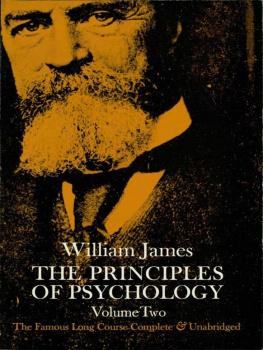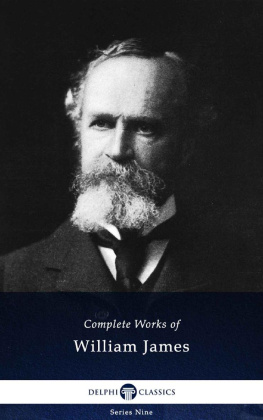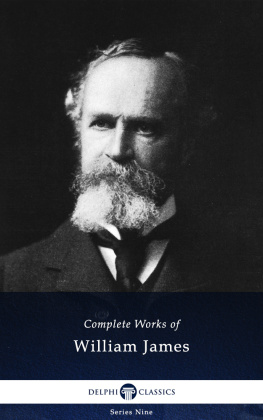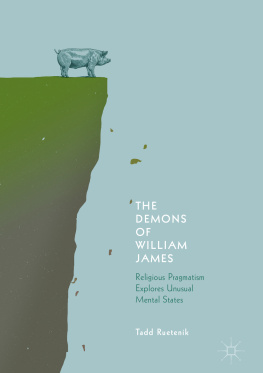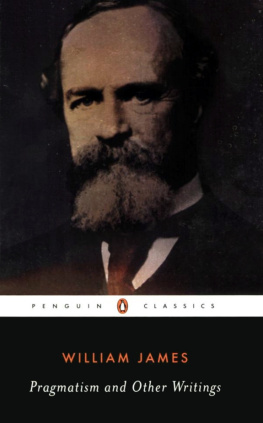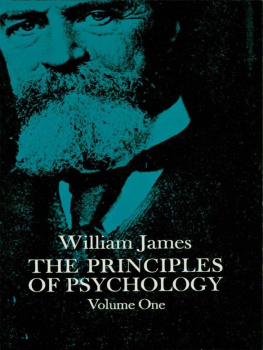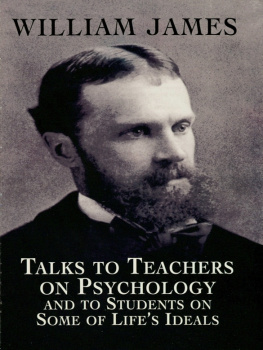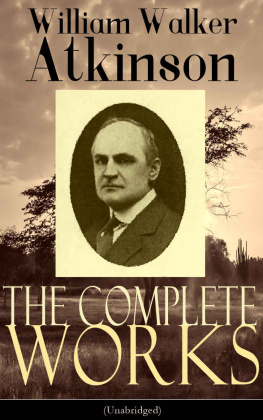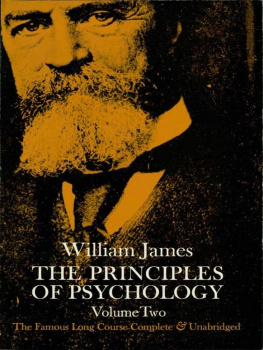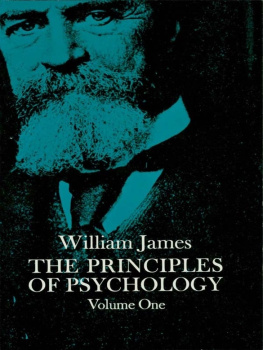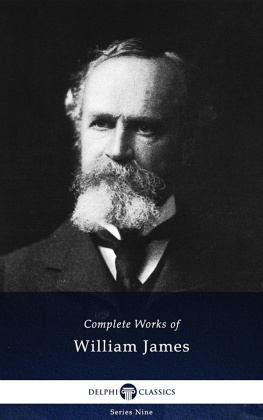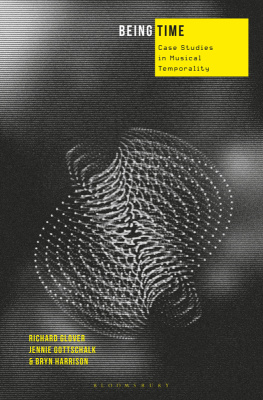William James - The Principles of Psychology, Vol. 2
Here you can read online William James - The Principles of Psychology, Vol. 2 full text of the book (entire story) in english for free. Download pdf and epub, get meaning, cover and reviews about this ebook. genre: Religion. Description of the work, (preface) as well as reviews are available. Best literature library LitArk.com created for fans of good reading and offers a wide selection of genres:
Romance novel
Science fiction
Adventure
Detective
Science
History
Home and family
Prose
Art
Politics
Computer
Non-fiction
Religion
Business
Children
Humor
Choose a favorite category and find really read worthwhile books. Enjoy immersion in the world of imagination, feel the emotions of the characters or learn something new for yourself, make an fascinating discovery.
- Book:The Principles of Psychology, Vol. 2
- Author:
- Genre:
- Rating:5 / 5
- Favourites:Add to favourites
- Your mark:
- 100
- 1
- 2
- 3
- 4
- 5
The Principles of Psychology, Vol. 2: summary, description and annotation
We offer to read an annotation, description, summary or preface (depends on what the author of the book "The Principles of Psychology, Vol. 2" wrote himself). If you haven't found the necessary information about the book — write in the comments, we will try to find it.
The Principles of Psychology, Vol. 2 — read online for free the complete book (whole text) full work
Below is the text of the book, divided by pages. System saving the place of the last page read, allows you to conveniently read the book "The Principles of Psychology, Vol. 2" online for free, without having to search again every time where you left off. Put a bookmark, and you can go to the page where you finished reading at any time.
Font size:
Interval:
Bookmark:

LANGUAGE, TRUTH AND LOGIC, Alfred J. Ayer. (Available in U.S. and Canada only.) (0-486-20010-8)
THE CROSS: ITS HISTORY AND SYMBOLISM, George Willard Benson. (0-486-44054-0)
CREATIVE EVOLUTION, Henri Bergson. (0-486-40036-0)
TIME AND FREE WILL: AN ESSAY ON THE IMMEDIATE DATA OF CONSCIOUSNESS, Henri Bergson. (0-486-41767-0)
AN INVESTIGATION OF THE LAWS OF THOUGHT, George Boole. (0-486-60028-9)
ARISTOTLES THEORY OF POETRY AND FINE ART, S. H. Butcher. (0-486-20042-6)
INTRODUCTION TO SYMBOLIC LOGIC AND ITS APPLICATIONS, Rudolf Carnap. (0-486-60453-5)
LANGUAGE AND MYTH, Ernst Cassirer. (0-486-20051-5)
EXPERIENCE AND NATURE, John Dewey. (0-486-20471-5)
How WE THINK, John Dewey. (0-486-29895-7)
THE WILL TO BELIEVE AND HUMAN IMMORTALITY, William James. (0-486-20291-7)
PHYSICS AND PHILOSOPHY, Sir James Jeans. (0-486-24117-3)
GUIDE TO PHILOSOPHY, C. E. M. Joad. (0-486-20297-6)
LOGIC, Immanuel Kant. (0-486-25650-2)
AN INTRODUCTION TO SYMBOLIC LOGIC, Susanne K. Langer. (0-486-60164-1)
MIND AND THE WORLD ORDER: OUTLINE OF A THEORY OF KNOWLEDGE, Clarence Irving Lewis. (0-486-26564-1)
AN ESSAY CONCERNING HUMAN UNDERSTANDING, John Locke. (Vol. I: 0-486-20530-4, Vol. II: 0-486-20531-2)
ETHICAL WRITINGS OF MAIMONIDES, Moses Maimonides. (0-486-24522-5)
THE GUIDE FOR THE PERPLEXED, Moses Maimonides. (0-486-20351-4)
HISTORY OF PHILOSOPHY, Julian Marias. (0-486-21739-6)
PISTIS SOPHIA: A CLASSIC HISTORY OF GNOSTIC WRITINGS, G.R.S. Mead. (0-486-44064-8)
AN INTRODUCTION TO EXISTENTIALISM, Robert G. Olson. (0-486-20055-8)
CHARLES S. PEIRCE: SELECTED WRITINGS, Charles S. Peirce. (0-486-21634-9)
PHILOSOPHICAL WRITINGS OF PEIRCE, Charles S. Peirce. (0-486-20217-8)
SCIENCE AND HYPOTHESIS, Henri Poincar. (0-486-60221-4)
THE PHILOSOPHY OF SPACE AND TIME, Hans Reichenbach. (0-486-60443-8)
THE PROBLEMS OF PHILOSOPHY, Bertrand Russell. (Available in U.S. only.) (0-486-40674-1)
THE QUEST OF THE HISTORICAL JESUS, Albert Schweitzer. (0-486-44027-3)
Paperbound unless otherwise indicated. Available at your book dealer, online at www.doverpublications.com, or by writing to Dept. 23, Dover Publications, Inc., 31 East 2nd Street, Mineola, NY 11501. For current price information or for free catalogs (please indicate field of interest), write to Dover Publications or log on to www.doverpublications.com and see every Dover book in print. Each year Dover publishes over 500 books on fine art, music, crafts and needlework, antiques, languages, literature, childrens books, chess, cookery, nature, anthropology, science, mathematics, and other areas.
Manufactured in the U.S.A.
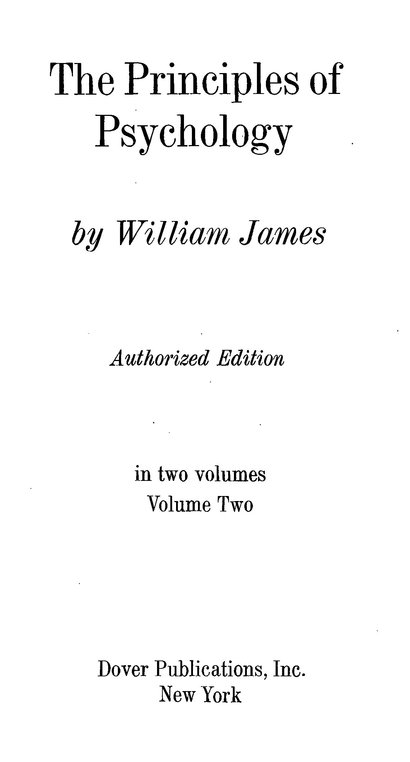
Copyright 1890 by Henry Holt & Co.
Copyright 1918 by Alice H. James
This authorized Dover edition, first published in 1950, is an unabridged and unaltered republication of the work first published by Henry Holt and Company in 1890. This edition is published by special arrangement with Henry Holt and Company.
International Standard Book Number
9780486130972
Manufactured in the United States by Courier Corporation
20382427
www.doverpublications.com

AFTER inner perception, outer perception! The next three chapters will treat of the processes by which we cognize at all times the present world of space and the material things which it contains. And first, of the process called Sensation.
The words Sensation and Perception do not carry very definitely discriminated meanings in popular speech, and in Psychology also their meanings run into each other. Both of them name processes in which we cognize an objective world; both (under normal conditions) need the stimulation of incoming nerves ere they can occur; Perception always involves Sensation as a portion of itself; and Sensation in turn never takes place in adult life without Perception also being there. They are therefore names for different cognitive functions , not for different sorts of mental fact. The nearer the object cognized comes to being a simple quality like hot, cold, red, noise, pain, apprehended irrelatively to other things, the more the state of mind approaches pure sensation. The fuller of relations the object is, on the contrary; the more it is something classed, located, measured, compared, assigned to a function, etc., etc.; the more unreservedly do we call the state of mind a perception, and the relatively smaller is the part in it which sensation plays.
Sensation, then, so long as we take the analytic point of view, differs from Perception only in the extreme simplicity of its object or content . a fact; and this knowledge admits of numberless degrees of complication. But in both sensation and perception we perceive the fact as an immediately present outward reality, and this makes them differ from thought and conception, whose objects do not appear present in this immediate physical way. From the physiological point of view both sensations and perceptions differ from thoughts (in the narrower sense of the word) in the fact that nerve-currents coming in from the periphery are involved in their production. In perception these nerve-currents arouse voluminous associative or reproductive processes in the cortex; but when sensation occurs alone, or with a minimum of perception, the accompanying reproductive processes are at a minimum too.
I shall in this chapter discuss some general questions more especially relative to Sensation. In a later chapter perception will take its turn. I shall entirely pass by the classification and natural history of our special sense-tions, such matters finding their proper place, and being sufficiently well treated, in all the physiological books.
A pure sensation is an abstraction; and when we adults talk of our sensations we mean one of two things: either certain objects, namely simple qualities or attributes like hard, hot, pain; or else those of our thoughts in which acquaintance with these objects is least combined with knowledge about the relations of them to other things. As we can only think or talk about the relations of objects with which we have acquaintance already, we are forced to postulate a function in our thought whereby we first become aware of the bare immediate natures by which our several objects are distinguished. This function is sensation. And just as logicians always point out the distinction between substantive terms of discourse and relations found to obtain between them, so psychologists, as a rule, are ready to admit this function, of the vision of the terms or matters meant, as something distinct from the knowledge about them and of their relations inter se. Thought with the former function is sensational, with the latter, intellectual. Our earliest thoughts are almost exclusively sensational. They merely give us a set of thats, or its, of subjects of discourse, with their relations not brought out. The first time we see light, in Condillacs phrase we are it rather rather than see it. But all our later optical knowledge is about what this experience gives. And though we were struck blind from that first moment, our scholarship in the subject would lack no essential feature so long as our memory remained. In training-institutions for the blind they teach the pupils as much about light as in ordinary schools. Reflection, refraction, the spectrum, the ether-theory, etc., are all studied. But the best taught born-blind pupil of such an establishment yet lacks a knowledge which the least instructed seeing baby has. They can never show him what light is in its first intention; and the loss of that sensible knowledge no book-learning can replace. All this is so obvious that we usually find sensation postulated as an element of experience, even by those philosophers who are least inclined to make much of its importance, or to pay respect to the knowledge which it brings.
Font size:
Interval:
Bookmark:
Similar books «The Principles of Psychology, Vol. 2»
Look at similar books to The Principles of Psychology, Vol. 2. We have selected literature similar in name and meaning in the hope of providing readers with more options to find new, interesting, not yet read works.
Discussion, reviews of the book The Principles of Psychology, Vol. 2 and just readers' own opinions. Leave your comments, write what you think about the work, its meaning or the main characters. Specify what exactly you liked and what you didn't like, and why you think so.

